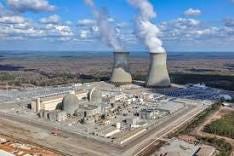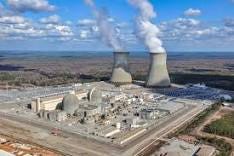CAN NUCLEAR ENERGY MEET CLIMATE GOALS?
The basic problem with nuclear is this: With all its problems and costs, why bother? Do we even need it?
Georgia’s Vogtle Nuclear Power Facility Is 7 Years Late and $17 Billion Over Budget. So Far.
Nuclear is dirty, dangerous, and way too expensive. We already have vastly cheaper and safer sources, Wind, Solar, Water, and Geothermal. What's the point?
Let's break it down.
Dirty.
You need uranium, and mining uranium is a cancer-causing occupation. Tens of thousands of Navahos and other who mined it in the southwest in the 50s and 60s, were sickened or died. Congress paid them off in a landmark but inadequate subsidy. It’s hard to buy much when you’re dead.
Dangerous.
The wastes last for hundreds or thousands of years. Nobody is willing to store it in their state, witness Nevada (Blue) and Texas (Red.)
The open cooling pools for the spent fuel are subject to easy attack. Nobody thought much about this until the Ukraine war. Well, now we do. Hello, Zaporizhzia. And in the future, Saudi Arabia, Iran, Pakistan, India, and more. Tribal restraint is not a human strong point.
The spent fuel is in the form of uranium pellets packed into tall thin rods arranged on racks inside storage containers. The dry storage containers in the US are mostly thin 5/8 inch single-walled canisters, with no sensors inside to see if materials are over-heating, and no way to take the tops off to deal with it if they are. The rods cannot be taken out and re-loaded into fresh canisters. The partially decommissioned plant in San Onofre with over over 73, 18 feet-tall-canisters holding 3.55 million pounds of nuclear waste at sea level is the poster child for this temporary and shoddy solution.
In the thicker, much better designed cans used in Europe, nuclear waste can supposedly be transferred to mostly undesignated so-called permanent storage, but we humans need to do that carefully and repeatedly for the next few hundreds or thousands of years. Are we up for that? That's putting a lot trust in the distant future, the condition of the earth and the abilities of your grandchildren 100X into that future.
You can argue not much goes wrong with these elaborate steam cookers we call nuclear power plants, but then there's Fukushima, Chernobyl, Three Mile Island, and some lesser, covered up accidents. Nuclear has a long half-life. Human memory is only one generation or two, 40 + years, so you need to think maybe a century ahead, and then factor in human error and nature's blips like those nasty tsunamis and earthquakes that occur in a cycle beyond one or two human generations.
Expensive.
Nuclear is heavily subsidized, a glaring waste of taxpayer money. We pay $500 million each year just to guard the plants. We’ve sunk billions for national storage non-solutions like Yucca Mountain, and we subsidize the research, too. The related Hanford, Washington, bomb making facility is currently estimated to cost an astounding $528 billion to clean up with no end in sight. The cost overruns for building new nuclear plants would make a Boeing executive blush. The Vogtle plant in Georgia, America’s only “new” facility, is 7 years late and $17 billion over budget. Georgia rate-payers will likely be stuck with $20.6 billion in extra utility bills over the life of the plant.
Republicans often like to "own the libs" and see opposition to nuclear as coming from neo-hippies or Democrats, and I'm fine with that. Just don't make me pay for your spend-thrift ways when cheaper and faster alternatives exist. Someone has to make these nuclear hawks fiscally responsible.
Too Late.
Which brings us to Time. It takes approximately 17 years to bring a new nuclear plant on line in the US. Whereas we have industrial level solar and wind already. All the money wasted on nuclear could go to solving the storage and grid problems which are not exactly rocket science, and provide more and better jobs (hello Energy Secretary Jennifer Granholm and Michigan Gov. Gretchen Whitmer.) Some smart people say we don't have time given the pace of climate change, overall temps hitting 2.7 degrees Fahrenheit (1.5C) in 5-7 years, with many rather unpleasant consequences, to mess with long range solutions like nuclear but that's a discussion for another HOT GLOBE.
You say what about the French? Well, what about the French? Half their nuclear reactors are now rusting and down for repairs, and there isn't enough water to cool them. Why? because climate change has already lowered the rivers. Far from being the poster child for going nuclear, France is becoming the poster enfant terrible for switching to cheaper, safer, quicker, and more reliable sources.
These are quick thoughts—and just the beginning. But why take it from me? Please tune in for a very important webcast from frontline experts including Gregory B. Jaczko, former chair US Nuclear Regulatory Commissioner, and Mark Z. Jacobson, Stanford professor of civil and environmental engineering and author of No Miracles Needed. (Liquidity Notice: I am a Senior Fellow of the Samuel Lawrence Foundation, which is sponsoring the event.)
The webcast was terrific, much clarity, well put. TO REPLAY OR DOWNLOAD THE PRESENTERS’ PRESENTATIONS, PLEAST CLICK THE LINK. SLIDES ARE ALSO AVAILABLE:
https://drive.google.com/drive/folders/1crG8ZPxCDj4iAg8CgsnxiRhVhzTZhCvt
Bring it on Stewart Brand and Oliver Stone!







https://drive.google.com/file/d/1Pe1-nZFToqKKrALa72aIjmSyc5bNg0i5/view
Yet another reason nuclear energy is a bad idea:
The U.S. Is Paying Billions to Russia’s Nuclear Agency. Here’s Why.
Nuclear power companies rely on cheap enriched uranium made in Russia. That geopolitical dilemma is intensifying as climate change underscores the need for emissions-free energy.